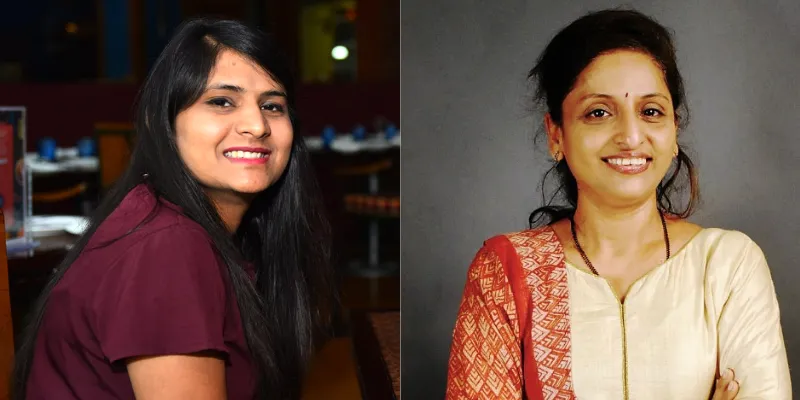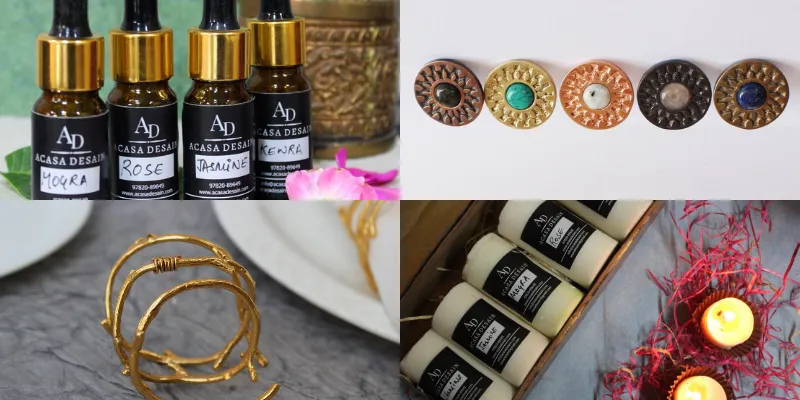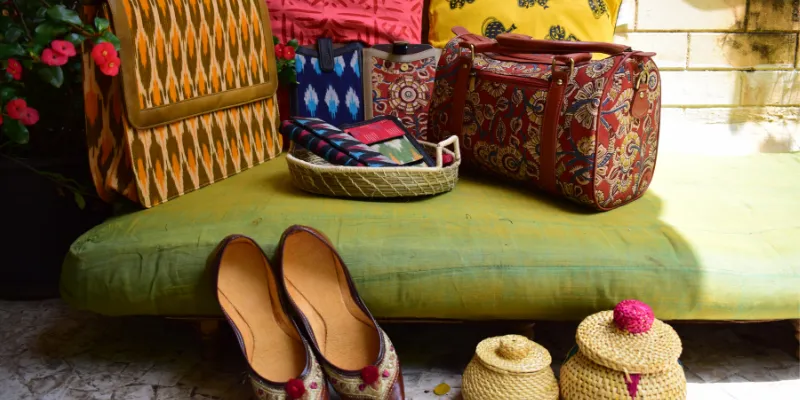These women entrepreneurs are beautifying homes and generating livelihood in rural India by innovating age-old handicraft traditions
YourStory is the outreach partner for SheLeadsTech from Facebook
India has a large community of rural artisans and craftsmen who possess skills passed down from generation to generation. Indian handmade products enjoy a niche global standing due to their exclusive craftsmanship, designs, finesse, colours and raw material, among others. Another reason is the eco-friendly aspect of a number of these handicrafts.
Several Indian startups working in these areas use natural, environment-friendly materials and processes to create their works. From eco-friendly scented candles made from soy and beeswax to handwoven sarees, the founders of these startups have something niche and eco-friendly to offer from the traditions of the rural community.

Akshya Agarwal and Dr. Megha Phansalkar (Left to right)
Akshya Agarwal, Acasa Desain
Akshya was born into a jeweller’s family in Jaipur, Rajasthan. Good at academics since childhood, she was a gold medalist in her MBA class and even had a placement in hand. But she always wanted to become an entrepreneur, and venture into something different from the jewellery business. In 2016, she decided to start Acasa Desain, a home décor venture.
“During MBA, I got an idea of how corporate culture works. So I rejected my placement offer and thought of starting a business that was creative and unique compared to what other brands in Jaipur offered,” says Akshya. Acasa Desain primarily caters to premium households, and produces eco-friendly soy and bee wax aroma candles and natural essential oils which are natural, organic, and don’t emit any harmful black soot.
Being surrounded by jewellery since childhood, her love for natural gemstones like lapis, rose quartz, turquoise prompted her to also create a range of handmade wooden and brass knobs with natural gemstones and gemstone coasters to beautify homes.

Products by Acasa Desain
As an entrepreneur, her key challenge was being in a niche industry. “Home décor products are not essential products for everyone. There’s a niche market of people who focus on making their home look beautiful,” says Akshya. She says the business gave her the opportunity to learn and take risks on her own.
She values client feedback, both positive or negative, and believes it’s an important part of a company’s success.
Her take on competition is that it exists in every industry. “To eliminate competition, we need to constantly figure out what is new and how we can do it differently in this industry,” she says. Currently, she’s selling on her own website, and on major international platforms like Etsy. Her goal is to host more exhibitions and cover more cities in India and abroad.
On the importance of creative spaces, she says that for young entrepreneurs and freelancers, renting a space is a liability. “In the early days, it’s best to work at cafés and co-working spaces where you can connect with other entrepreneurs.”
She strongly believes people should use more eco-friendly, natural and organic products as they help protect the environment, reduce pollution and is better for our health. Her advice to other women entrepreneurs is to not quit easily and believe in yourself and your work. “Love your work, it can take you to great heights,” she says.
Dr. Megha Phansalkar, Tisser Rural Handicrafts
Based in Mumbai, Tisser Rural Handicrafts Pvt Ltd and Tisser Artisan Trust was started by Dr. Megha Phansalkar in 2015 as a social venture to uplift the lives of rural Indian artisans. While working as a consultant for the National Rural Livelihood Mission (NRLM) in the World Bank, she realised that there are thousands of Indian artisans whose livelihood solely depends on the handicrafts and handlooms, the knowledge of which has passed down as a legacy in their families for generations.
With changing times, these art forms and handlooms are getting dated and due to lack of innovation, are becoming redundant. “Seeing the need of the hour, we adopted a unique model by supporting artisans with product design and diversification through IT-enabled innovations,” she says. They do this by expanding artisans' product portfolio by cataloguing and marketing their products on various platforms. They use blockchain technology for the supply chain by depicting artisan contribution and profit from a product. They raise awareness by featuring artisan stories, training programmes, product stories on social media to provide a background of the effort that goes into making a product. “We have helped improve artisan connects, by working on end-to-end cluster development,” she adds.

Products by Tisser Rural Handicrafts
Initially, the biggest challenge for her was to get the vast disorganised artisan community onto a single platform platform, and streamline the demand as well as the marketing resources. “The leanings in the initial stage are immense: products need better packaging, prices have to be competitive, it is necessary to create your own brand, people like new designs, fusions are encouraged.”
Tisser products are sold online and offline on B2B and B2C platforms. The B2B clients include resellers, distributors, shop-in-shops, event managers, online marketplaces. B2C clients are exhibitions, retails stores.
Megha says that Tisser provides end-to-end support, unlike competitors. “Online marketplaces have middlemen and no original products which leads to marked-up prices. Bulk traders and event managers have middlemen and do not offer customisation. Retail stores also do not provide any customisation. Producer groups, although willing to customise, lack the design support to compete in the market. We start from artisan mobilisation to design and product interventions and customisation, coupled with marketing support through online and offline portals.”
According to Megha, who has a doctorate in IT, technology is an important aspect of the business and should be explored on a regular basis. They have developed a technologically advanced platform for artisans to upload their product inventory directly to the Tisser website. The won the Manthan South Asia Award in 2018 for this innovation. They are also working with Vyoma Software to develop a Distributed Ledger (DLT) based supply-chain solution which will provide transparency to customers to make informed decisions, and give greater exposure to the artisans and their work.
In the last three years, Tisser has formed a network of more than 10,000 artisans, majority being women, connected with more than 1,800 self-help groups across 18 Indian states, generated employment of more than 80,000 man days in a year, and designed over 1,000 customised products. Through the Tisser Artisan Trust, they have created a fair pricing for the artisan community, encouraged social entrepreneurship, and supported education of girl children in the artisans’ families. Megha has bagged several awards like the Indira Gandhi Award for Women Entrepreneurship, Social Entrepreneur of the Year by SP Jain College of Management, among others. They have also been mentored by Thomson Reuters, Procter and Gamble, and the Ministry of Micro Small and Medium Enterprises (MSME), among others.
In the next five years, Tisser aspires to triple its strength in terms of revenue, brand value and products through structured strategic intervention and partnerships. “We want to increase the number of intensive dedicated clusters, from 50 in 2019 to 250 in a span of three years. We also want to establish a flagship store in 2019 and scale our franchise model from 5 to 25 stores pan India,” says Megha.
A part of the Facebook SheLeadsTech community
SheLeadsTech is a programme by Facebook to support women entrepreneurs in India by providing access to community, tools, resources, mentorship, and more. As part of the programme, they are able to meet other budding entrepreneurs and get access to programmes like FbStart, monthly Ask me Anything (AMA) sessions, and so on.
Akshya says this is a great opportunity for women to come together, share their experiences and support each other. “We get to meet other women who are facing challenges similar to ours, or have achieved their goals in various industries,” she says. Megha, who has attended a meetup in Mumbai, says, “It was inspirational to network with other women entrepreneurs working in different sectors, and listen to their stories of struggles and success.”







